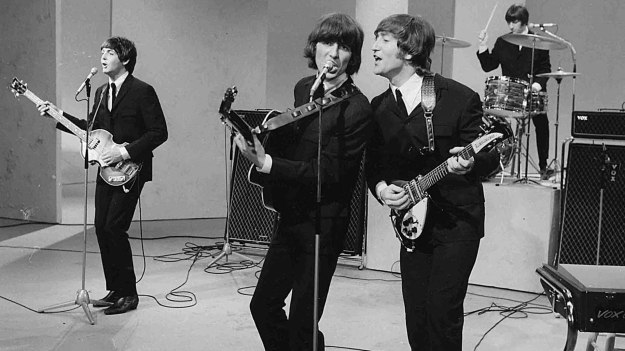With a straight face, the Vocal Group Hall of Fame inducted the Manhattan Transfer before The Beatles.* Really.
So absurd is the scale of The Beatles’ achievements within popular music that we sometimes put them in a box by themselves, lest we be unfair to everyone else by making comparisons. We talk about, say, Don McLean and James Taylor as singer-songwriters without acknowledging that, by any meaningful definition, John Lennon and Paul McCartney (and for that matter Stevie Wonder and James Brown) were singer-songwriters too. But Lennon and McCartney were Beatles, which makes them somehow other, a category unto themselves.
We’ve got the big picture right – they are incomparable within popular music. But our judgement of them is skewed in favour of the huge obvious masterpieces. Of course we bow down in awe before Strawberry Fields, Penny Lane, Tomorrow Never Knows, Eleanor Rigby, Yesterday, Hey Jude and so on. Who wouldn’t? But The Beatles would have belonged to the ages if they’d never made another record after A Hard Day’s Night.
One of the chief pleasures of listening to The Beatles’ early records is to hear them tearing through styles and genres, delivering precociously accurate yet idiosyncratic takes on each of them, then moving on to the next thing. Girl group pop. Bakersfield country. Hollywood musicals. Hard R&B. They could do everything. As much as they were the originators of much of what we talk about when we talk about rock and pop music, The Beatles were the world’s greatest human jukebox, their ability to assimilate and mimic styles of pop honed in sweaty late-night gigs in Hamburg clubs and adrenalised lunch-time sets at the Cavern.
Lennon and McCartney had the two greatest rock ‘n’ roll voices Britain has ever produced, both of them with enough acid in their throats to strip paint off the wall if they so chose. Yet they could harmonise like angels too, switching from one to the other with the sort of ease most singers would kill for.
Probably only McCartney could tell you what sparked the band’s collective interest in harmony singing. We know that he and Lennon were practised Everly Brothers imitators in their teens, and that hints of that influence are audible throughout their work, up to Let it Be, where they recorded Two of Us explicitly in the Phil-&-Don style. But the dominant influence vocally on The Beatles’ first few albums are The Shirelles and Smokey Robinson & the Miracles.
Boys, a 1960s Shirelles single that The Beatles covered on Please Please Me with Ringo on lead vocal, features Lennon, McCartney and George Harrison singing three-part harmonies in call and response with Starr (in a dead-on recreation of the original arrangement). It’s huge fun, and all four throw themselves into it excitedly. It’s probably the least self-conscious, most satisfying vocal Ringo ever sang, and shows a band forthcoming about its influences.
You Really Got a Hold on Me is something else again. Recorded not much more than six months after Smokey Robinson & the Miracles’ own version, it sees Lennon and Harrison singing the verses with McCartney joining in on the high third part (taken on the original by Claudette Rogers) in the choruses. The rhythm section on the Miracles’ record is slightly more subtle than the Beatles were, but not by much, and this impression may just be because of the relative lack of low end on the Beatles’ early records. Vocally, though, Lennon’s lead is hugely impressive technically and emotionally, and McCartney and Harrison are magnificent in support. Lennon would probably not have accepted the compliment, as he was always rather insecure about his singing voice, but he’s every bit as good as Smokey was on the original.
If you don’t know the Beatles’ early albums, do check them out. The singles (which you can get on the Red album, or Past Masters Vol. 1 or the newly remastered and re-released 1) aren’t the whole story by a long way. Their first few records (everything up to Beatles For Sale) showcase the band’s full, enormously wide, musical range. As such, they are full of great harmony vocal performances, on both the original material and the covers. The couple of songs I’ve talked about just happen to be among my favourites.
Of course, the band’s other achievements are so vast that we just consider their harmony vocals as a mere facet of what they did, but among everything else they did and were and represent, The Beatles are one of pop music’s finest harmony singing groups.

*Six years before, in fact. Because the ability to travesty Edith Piaf and sing “ra-da-da-da-da” in perfect unison is presumably a greater achievement then anything the Beatles did.